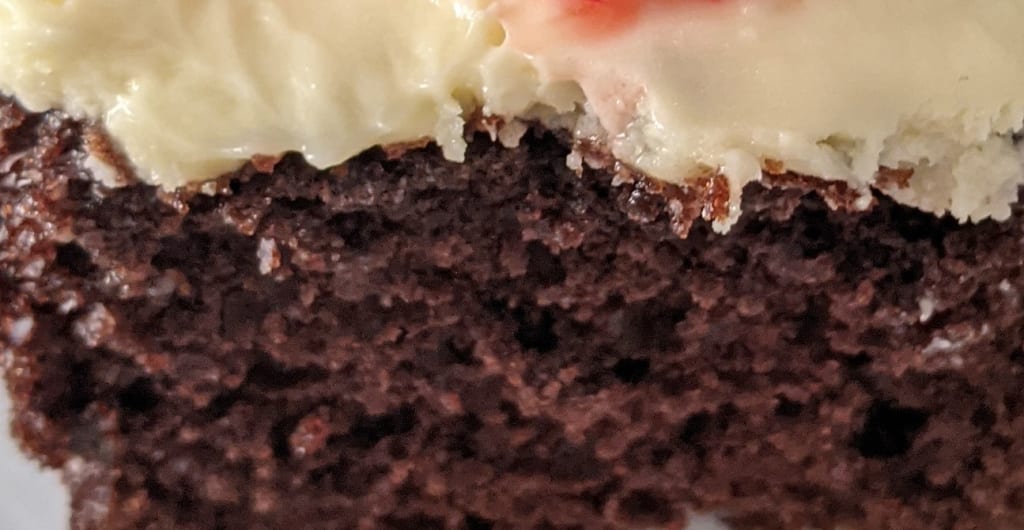
“I learned to bake when I was your age,” my Grandma Helen said to me one summer morning. I was eight years old, visiting the big Victorian on Vine Street, which had come down through the family through many generations, its walls catching our family history like a spider catches flies in her net. Until that moment, I’d felt unseen by this woman. Now I was to learn something my father often called ‘the family secret’. She was going to show me how to bake Devil’s Food cake, but not from some cheap store mix. I was going to learn the real recipe, the one that had been passed down through my family’s generations.
Grandma Helen stood in the sunlight, looking down at me. Her hair, more black than silver, was pinned up at the back of her head. She wore one of her dresses, the lilac cotton one she’d sewn herself when she was thirty-five and not yet a widow. Over it was an apron in a lavender print that made her look as though she had stepped out of those old re-runs we watched on tv. The ones where the mothers never wore jeans and always looked as if they would faint if they heard a curse word.
But my Grandma Helen was no delicate housewife blushing and acting dim. She swore like a sailor when she was mad, drank her whiskey straight, and when she said jump, you’d better jump or else.
I adored her; she was the perfect lady almost all the time, whiskey and cussing saved for those moments when she knew she needed to intimidate or startle. “Keeping people on their toes is good for them,” Grandma used to say. “If they don’t know quite what to expect, then they are less likely to think they can take advantage of a situation, do you understand me, Christopher?”
I would nod. “Yes Grandma,” I always said, although I didn’t quite get it until I was much older.
That morning in her kitchen was the first time I actually cared what she thought of me. To know that I was going to be given the secret of the Devil’s Food cake made me stand up straighter and try to look good enough for the honor. I already knew I enjoyed baking and this, at last, would prove that it wasn’t just something girls did.
The ingredients were lined up on the counter, neat and pre-measured, as if someone might come along and film us. I remember how she plucked the vanilla extract from among the glittering bowls and measuring cups, holding it with her immaculate nails, always polished some transparent, pearl shade. “The first thing to know is that it has just a touch of vanilla.” Her bright, blue eyes glittered, with wicked delight, as if she’d been dying to tell someone this for most of her life. “Too much and it changes the taste completely. Too little and you might as well use none at all. But, if you get it just right, it adds a little mystery to the cake.”
“It’s time,” Richard, says, pulling me into the present. The Victorian sits ahead, at the end of the narrow walk, the windows full of light, the Christmas tree blazing in the huge, bay window, just like every year.
Richard guides me up the walk with a gentle hand on my elbow. Neither of us really wanted to come, but you cannot love people when it’s easy and leave them when it gets difficult. Grandma Helen’s words to me the day before I married Richard, before we had ever thought of having a child to raise, over the rich, dark batter of her Devil’s Food cake. “A little more vanilla,” she said, smiling. “That’s the secret, of course.”
“I know,” I told her.
She paused, reaching out, her small hand touching mine gently. “Christopher, it’s the secret to a lot of things. When everything is all dark and bitter, you’ve got to remember that just a touch of sweetness will go a long, long way.”
I’ve never forgotten her words. Not through the worst of my arguments with Richard. Not when my father called me with news of his cancer. Not when I sat next to my mother after her stroke, wondering if she’d know me when she opened her eyes. Not even when our daughter screams hateful words at us for not allowing her to date anyone. Especially not the school quarterback (and the boy who drove his car into the canal twice in the same year because he was too drunk to see the curve in the road).
Just a touch of vanilla. Just a taste of sweet. It makes life so much better. My grandma spent most of my life teaching me that, even if she only said it plain twice, the day before I married the love of my life and the day we decided to adopt Megan.
I’ve tried to teach that to my daughter. I think she understands, but it’s hard to tell; her face is glued to her phone even now, as we make our way up the icy walk. “She’s a good girl,” Grandma Helen always says and I believe in her even when I doubt myself; she’s never led me wrong.
“Love is love,” Grandma Helen said the night I told them all I preferred boys to girls.
“It’s against God,” my father said. And I’ll never forget the way my grandmother looked then. Always the lady, always composed, but ready to smack her son soundly with her whiskey glass, should he need it.
“And when was the last time you spoke to God?” she asked, her tone as icy as her brilliant eyes.
“The bible…,” he managed to begin, but I could see how she scared him.
“Was written by men,” my grandmother said. “Men make mistakes. With translations. With their own ideals. But God does not make mistakes. And my God would not create children with the intent to challenge their parents to try and change them. My God does not play such games.”
There was never any other talk of how wrong I was in Grandma Helen’s presence after that. I went to live with her and never once did she allow me to believe I was anything but as God intended. In her eyes, I was a gift and she loved me right down to my toenails.
We step through the oak door, into the foyer. The smell of cinnamon, black forest ham, and wood polish permeates the air. I hear my mother singing in the kitchen. She never sang when I was younger. I don’t even remember her smiling much. But Grandma Helen has a way of cracking people open, making them who they really are. After Dad got cancer and died, my mother moved moved in here.
“I always did want a daughter,” Grandma said. “And I’m getting too old to be living in this old house alone.” That was who she was, always helping others, always knowing just what to do when someone was lost or troubled.
I look at my little family now. Megan has put the phone away; she knows her grandmother will steal it and hide it if she keeps it out. They smile at me. I nod, turn, and follow the hallway down. Take a deep breath. Open the kitchen door.
“Christopher!” Grandma Helen says, eyes lighting up at the sight of me. They are a little faded, more gray than blue, but they are still hers.
I exhale, then, relaxing a little. The day will come when she doesn’t recognize me. I have tried to prepare, but every visit begins with dread. Will this be the time I’m a stranger?
She never called me Chris. It was always Christopher. “You were named for a saint,” she always said. “Respect that.”
I feel an overwhelming surge of love. At eight, standing in her large, immaculate kitchen, I did not realize just how much she was giving me in a single recipe. The secret of the cake, the secret of life, none of that mattered to me right then. I just wanted to mix the batter so I could lick the spoon.
Over the years, I’ve made the cake for weddings, anniversaries, birthdays, and broken hearts. I’ve taught my daughter the recipe and even gotten her to leave her phone behind long enough to have an honest conversation. No phones in the kitchen. That’s our rule and, for a wonder, she fights it only a little.
Most families have dressers or silver candlestick holders. They have houses and pedigrees and grandma’s carnival glass. My family has a cake. Thick, dark chocolate that is never too sweet, with just a touch of vanilla to draw out the dark decadence.
I set dessert, my daughter’s first, real attempt, done with only my supervision, on the sideboard. She’s added her own touch, a drop of sharp mint, and one taste of the batter told me that it has changed it just enough to make it hers.
I look at my grandmother, head drooping, chin on her chest, hair still more black than silver. My heart squeezes painfully. I remember another summer day, one not that long ago. Same kitchen. Same neat line of ingredients. Only the vanilla was missing.
I plucked it down from the cabinet and I watched my grandmother smile. “Oh, what a wonderful idea, Christopher! You know, my Grandmother Madeleine used to put just a touch of vanilla in her Devil’s Food cake.”
I knew right then something was wrong, but I didn’t want to believe it. Even as the doctor, safe behind his huge desk and certificates, where words couldn’t touch his human side, said dementia, I couldn’t quite accept it. But the missing bottle of vanilla haunted me. It was an omen. Proof that my beautiful, well-bred grandmother was human. Proof I wouldn’t have her forever.
She talks some over dinner, picking at her meal with little interest as we all try to stay merry. She perks up when my daughter begins to chatter on about the boys she isn’t allowed to date and the play she’s staring in for the drama club. “Romeo and Juliet,” Richard groans to my mother. Then he smiles; no school ever has the imagination to think beyond Shakespeare and we both know it. That we have her, this remarkable child, is enough to pull us through a hundred high school declarations of Romeo’s love.
Every time I look at Megan, I see my grandmother telling me that having parents who love you and want you is far more important than worrying about what other people might think. I see her mother in her, but I also see Richard in her sharp wit and me in her soft heart and I know that no daughter was ever loved better.
Finally, it’s coffee and cake. I stand next to my mother, who smiles at her granddaughter as if remembering her own version of Juliet. Then she sighs. “Helen is sinking.” She looks sad. Worn. “I always thought she was indestructible.”
“Nobody is,” I say, leaning against her just a little to comfort her, but I was thinking the same thing. Grandma Helen always seemed like forever. Now here we are, with a woman who sits silent, trying to grasp at quicksilver memory, forgetting the war, her life, the vanilla, and seeing people long dead or who never existed at all.
We carry the dessert to the table, the silver knife flashes as it slices through the dark, almost black, chocolate. I take a fat wedge for Grandma Helen, place it in front of her. She stares at it, blue eyes so faded they are almost gray. She sighs.
“You know,” she says in a soft, thin voice, nothing like her own, “This would be so much better. If only you’d known to use vanilla.”
About the Creator
Kaiya Hart
I write fantasy (all sorts) and horror (mostly paranormal). I've been writing for over twenty years. I love what I do and I'm always striving to get better at it.






Comments
There are no comments for this story
Be the first to respond and start the conversation.